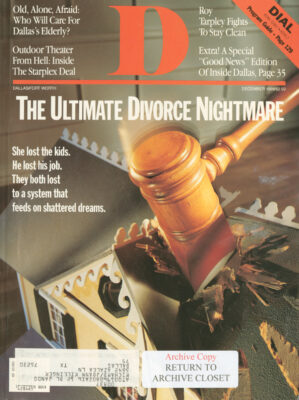In the quiet classrooms of the East Dallas Community School, twenty children, ages three to six, most of them minorities, are working. Some polish brass to develop hand-eye coordination, some work number puzzles, and others arrange small objects alphabetically. The teacher huddles with a boy arranging numbers in ones, tens, and hundreds columns, and an assistant teacher roams the room helping where she is needed. The class appears unstructured and open, yet there is an underlying structure that helps these children to learn.
The school was founded by Terry Ford, a former first-grade teacher who was troubled by the failure of low-income and minority children in DISD. Ten years ago she quit her job and formed the East Dallas Community School. The purpose, she says, was to prove that underprivileged children can learn and excel under the right conditions. Of the children who have completed all six years at the school (from age three through third grade), 100 percent are now making straight As in public school. Of those who have completed three or more years at the school, 96 percent have at least a B average.
“We stress two important factors here,” says Ford. “Knowing basic facts, and self confidence.” EDCS uses the eighty-year-old Montessori method, which encourages children to learn based on their own curiosity. “Most kids learn some things faster than they do others,” Ford says. “Here, they can zoom ahead in the things that they’re on fire about, and take their time learning the things that are harder for them.” Because learning is individually based, students aren’t stigmatized for being slow learners. In the mixed-age classrooms, students are encouraged to help one another, and the younger kids learn the rules of the classrooms from the older kids. Every student acts as a teacher at one time or another.
A nonprofit organization, EDCS draws at least 60 percent of its students from families with incomes below the poverty level. Most of the other 40 percent are barely above that level. The school is funded primarily by private donations, although it occasionally gets some help from local charity foundations, but no government support. “We get a lot of help,” Ford says, “from the parents.” Eighty percent of the parents spend two to three hours a week at the school doing volunteer work, from typing to structural repair of the buildings. “When the kids see their parents up here working,” says Ford, “it really motivates them.”
The East Dallas Community School has three long-term goals: to expand the student base to 150 students (it’s fifty-five now); to institute a classroom for children less than three years old; and to set up a resource center to help parents learn how to help motivate their children. But Ford says she doesn’t want the school to become so big that the special relationship between parents, students, and staff will be lost. Meanwhile, there are more than 200 students on the waiting list to get into the school. Considering its success-and the fact that the EDCS spends $3,295 per student per year, compared to more than $4,800 in DISD- there may be a lesson here for the public schools. “What we’re doing,” says Ford, “is proving that kids who get a good foundation can have a better school experience and a better life.”
Get our weekly recap
Brings new meaning to the phrase Sunday Funday. No spam, ever.
Related Articles

Arts & Entertainment
DIFF Documentary City of Hate Reframes JFK’s Assassination Alongside Modern Dallas
Documentarian Quin Mathews revisited the topic in the wake of a number of tragedies that shared North Texas as their center.
By Austin Zook

Business
How Plug and Play in Frisco and McKinney Is Connecting DFW to a Global Innovation Circuit
The global innovation platform headquartered in Silicon Valley has launched accelerator programs in North Texas focused on sports tech, fintech and AI.

Arts & Entertainment
‘The Trouble is You Think You Have Time’: Paul Levatino on Bastards of Soul
A Q&A with the music-industry veteran and first-time feature director about his new documentary and the loss of a friend.
By Zac Crain


